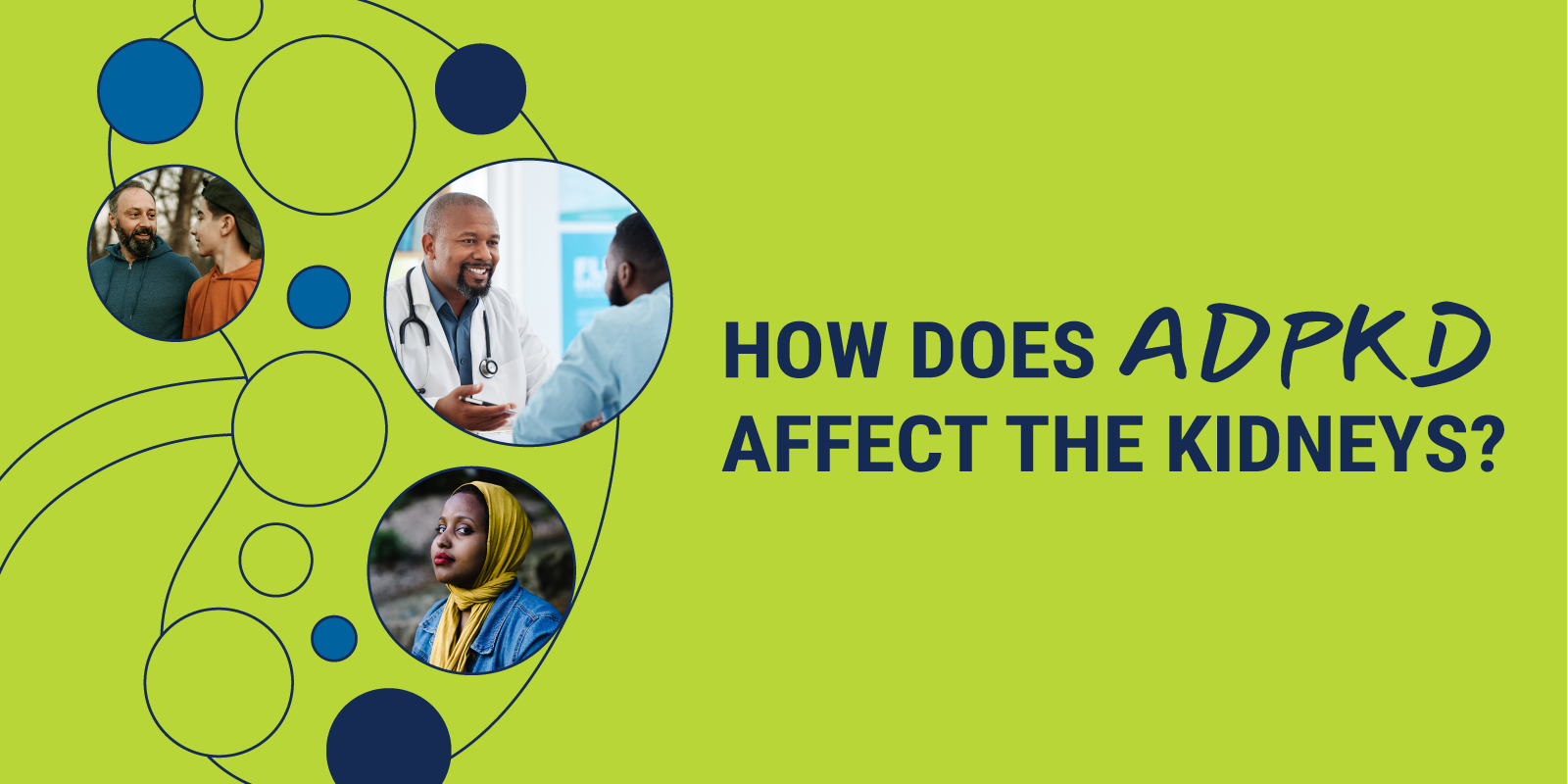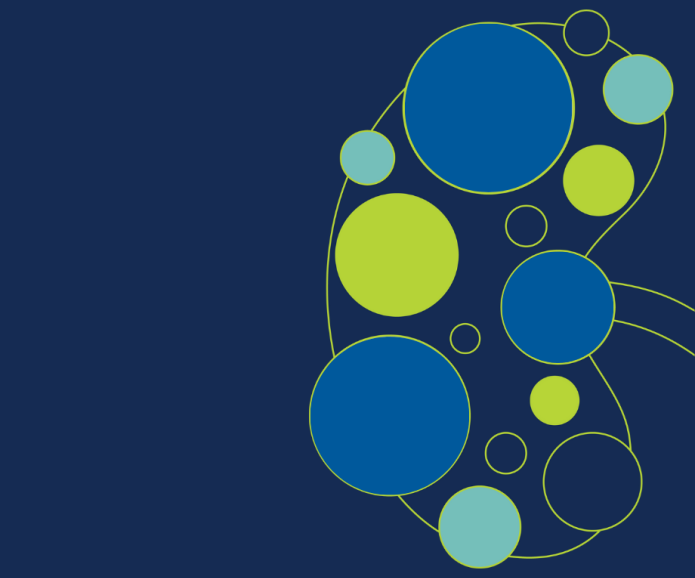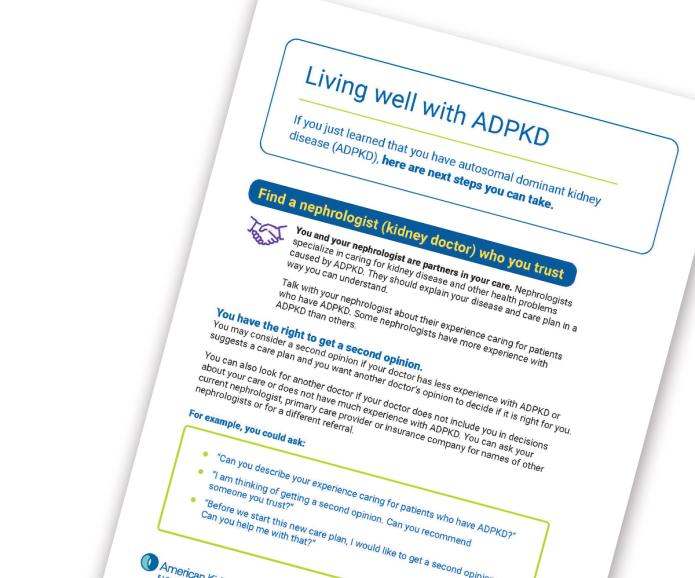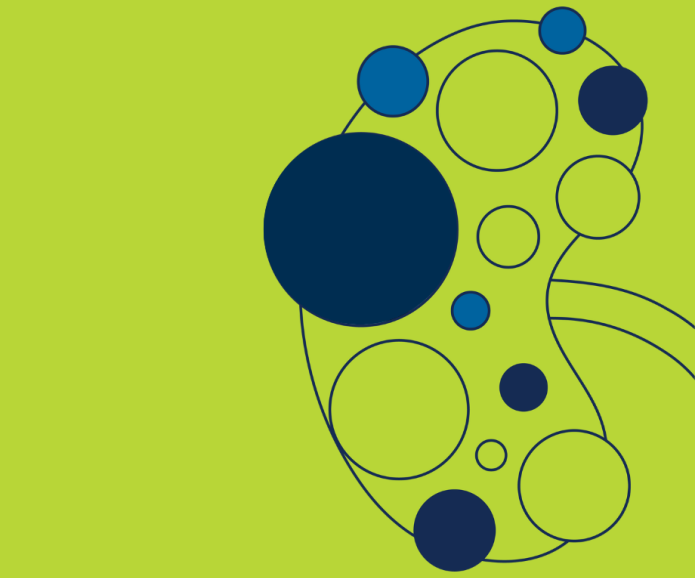
Polycystic kidney disease (PKD) symptoms, treatments & causes

- Medically reviewed by
- AKF's Medical Advisory Committee
- Last updated
- October 11, 2022
Jump to
- {wysiwyg_placeholder}
- What is polycystic kidney disease (PKD)?
- {wysiwyg_placeholder}
- {wysiwyg_placeholder}
- {wysiwyg_placeholder}
- {wysiwyg_placeholder}
- {wysiwyg_placeholder}
- Request a Talk to Your Doctor Guide about ADPKD
- {wysiwyg_placeholder}
- {wysiwyg_placeholder}
- {wysiwyg_placeholder}
- {wysiwyg_placeholder}
- Is acquired cystic kidney disease a type of PKD?
- {wysiwyg_placeholder}
Polycystic kidney disease (PKD) is a genetic disorder that causes many fluid-filled cysts to grow in your kidneys, leading to kidney damage. There are two types of PKD: autosomal dominant polycystic kidney disease (ADPKD) and autosomal recessive polycystic kidney disease (ARPKD). PKD causes chronic kidney disease (CKD), which can lead to kidney failure or end-stage renal disease (ESRD). ADPKD affects up to 12 million people around the world and is the 4th leading cause of kidney failure globally.

Polycystic Kidney Disease
What is polycystic kidney disease (PKD)?
Polycystic (polly-SIS-tick) kidney disease (PKD) is a genetic disease. It is caused by a change (mutation) in your genes. There are different genetic mutations that can cause PKD.
PKD causes many cysts to grow in your kidneys. Cysts are abnormal, fluid-filled sacs or growths. The cysts gradually grow large and damage the kidney tissue, leading to loss of kidney function. Thousands of cysts can grow in your kidneys and cause a kidney to weigh up to 30 pounds!
What are the two types of PKD?
There are two types of PKD: autosomal dominant PKD (ADPKD) and autosomal recessive PKD (ARPKD).
| Autosomal dominant PKD (ADPKD) | Autosomal recessive PKD (ARPKD) | |
|---|---|---|
| What can I expect if I have PKD? | ADPKD causes cysts to grow in your kidneys. Over time, APKD can affect other organs, such as your heart, brain, and liver. About 50% of people with ADPKD will be in kidney failure by age 70. | ARPKD causes cysts to grow in your kidneys. It can be deadly for newborn babies. Over 50% of children who survive will be in kidney failure by the time they are 15 to 20 years old. ARPKD can affect other organs, most often the liver. |
| How is this type of PKD inherited? | ADPKD is passed from parent to child. Each child of a person with ADPKD has a 50% chance of inheriting the disease. | ARPKD is passed from parent to child. Children of parents who are both carriers of the gene have a 25% chance of inheriting the disease. |
| When do symptoms start? | Symptoms often start when you are between 30 and 50 years old, which is why it is also called "adult PKD", but can also begin earlier in childhood. | Symptoms start in babies, sometimes even before they are born while in the womb, which is why it is also called "infantile PKD." |
| How common is it? | The most common type of PKD- about 90% of PKD cases are ADPKD. | This form of PKD is very rare, about 1 in 25,000 people. |
What causes PKD?
A change (mutation) in your genes causes PKD. Genes are part of your cells that contain DNA and tell your cells what to do. DNA is found inside every cell in our body and carries information that gets passed from one generation to the next. Almost always, PKD is passed down from an affected parent or from both parents who might be carriers (not have PKD) to their child. New mutations rarely occur in an individual without a family history of PKD leading to disease in them.
What is autosomal dominant PKD (ADPKD)?
Autosomal dominant PKD (ADPKD) is the most common type of PKD and one of the most common genetic kidney diseases. About 9 out of every 10 people with PKD have ADPKD. ADPKD causes cysts to grow in your kidneys and can also affect other organs, especially the liver.
What causes ADPKD?
ADPKD is caused by a change in a specific gene (either the PKD1 or PKD2 gene). If a parent has ADPKD, they have a 50% chance (or one in two chance) of passing the changed gene to each of their children. This means there's also a 50% chance a child will not inherit the changed gene.
In 9 out of 10 cases, if you have ADPKD, then one of your biological parents also has the change in the PKD1 or PKD2 genes even if they were not diagnosed with ADPKD.
The genetic change that causes ADPKD can sometimes happen during your life without either of your parents having passed the changed gene to you. But this only happens in 1 out of every 10 people with ADPKD.
What are the symptoms of ADPKD?
Symptoms usually start when you are between 30 and 50 years old. This can vary depending on how many cysts you have and how big they are. Symptoms include:
- Pain in your back and sides
- Headaches
- Blood in your urine (pee)
- High blood pressure
- UTIs (urinary tract infections)
- Kidney stones
If you have any of these symptoms or a biological parent or sibling with PKD, talk with your doctor.
ADPKD and Pain
Pain is a common symptom of ADPKD. The pain is usually intermittent and mild, though sometimes it can be constant and severe.
For those with mild pain, acetaminophen is typically used to manage it. It's usually recommended to stay away from non-steroidal anti-inflammatory drugs (NSAIDs) like aspirin, ibuprofen, and naproxen, as these could further harm your kidneys. Talk to your healthcare provider about what type of pain medicine you should take.
If you have very large cysts that are causing pain, your doctor may decide to treat them by aspirating (draining) and sclerosing (shrinking) them. During these procedures a doctor will use an ultrasound or CT scan to guide the insertion of a needle into the cysts to drain the fluid and coat the cyst with chemicals to remove the lining cells to prevent it from growing back. Talk to your healthcare provider about your options for treatment and what they recommend.
ADPKD and Hypertension
Hypertension (high blood pressure) is commonly seen in people with ADPKD. In fact, it can happen even before the kidneys start to fail. Hypertension occurs in 60% of ADPKD patients before any kidney problems begin to show up and is often the earliest symptom of ADPKD.
In ADPKD, hypertension occurs because the growing cysts can damage the kidneys and cause them to retain sodium and water, which raises blood pressure. Also, the body's system for controlling blood pressure called the renin-angiotensin-aldosterone system (RAAS), might become overactive due to the cysts pressing on the kidney cells. High blood pressure is also related to kidney volume (total size of the kidney cysts in ADPKD). It is the major risk factor for early cardiovascular disease.
It's important to treat hypertension because controlling high blood pressure has shown not slow the growth of kidney cysts in ADPKD. Patients with ADPKD are also at higher risk for intracranial aneurysms (ICAs) and subarachnoid hemorrhage (SAH), two kinds of brain bleeds. Uncontrolled high blood pressure increases the risk of brain bleeding. If you have a family history of brain bleeds or unexplained sudden deaths, let your doctor know.
If you have hypertension and PKD, you can take steps to control your high blood pressure, which includes quitting smoking or using tobacco products and taking prescribed medicines for hypertension.

Learn more about ADPKD
Download our Living Well with ADPKD Guide to learn about the next steps after diagnosis.
How will I know if I have ADPKD?
Your doctor will do tests to know if you have ADPKD, such as:
- Imaging tests to look for visible signs of cysts in your kidneys, such as ultrasound, CT scans and MRI scans
- Genetic tests to look for changes in the gene that causes ADPKD, using a sample of your blood or saliva (spit)
What other health problems can ADPKD cause?
When your kidneys are not working as well as they should, it can cause other health problems such as:
- High blood pressure
- High blood pressure may be found before kidney damage
- Kidney pain
- Kidney failure or ESRD–more than half of people with ADPKD have kidney failure by age 60, and it happens more in Black people compared to white people
- Kidney stones
- Cysts in your pancreas or liver
- Heart valve problems
- Brain aneurysms (a bulge in a blood vessel in the brain)
- A problem during pregnancy called preeclampsia (a type of high blood pressure)
How do doctors care for ADPKD?
There is no cure for ADPKD. Your doctor can recommend strategies to manage some of the symptoms and health problems caused by ADPKD.
- Pain Management: If you have ADPKD and are in pain, there are many ways to help you feel better.
- Your doctor might suggest simple things like using heat or ice, getting massages, or taking medicine like acetaminophen, and if those don't work, there are other treatments they can try to help you manage your pain.
- For long-lasting pain, your doctor might recommend stronger medicines like opioids or gabapentin, which can help with nerve pain.
- In some cases, if the pain is really bad and won't go away, your doctor might talk to you about special procedures like nerve blocks or even surgery to remove cysts.
- High blood pressure: doctors usually use two classes of medicines, ACE inhibitors and ARBs, to help lower your blood pressure. Lifestyle habits like regular exercise and eating kidney-friendly foods can also help lower your blood pressure.
- Kidney damage: ADPKD can damage your kidneys, leading to a decline in kidney function. Kidney damage can lead to kidney failure, which is treated with dialysis or transplant.
- Medicines and Cyst growth: a new medicine, Tolvaptan, was approved by the FDA that slows the growth of cysts for people with ADPKD and helps the kidneys continue to function, delaying the need for dialysis or transplant.
Talk to your doctor about all the options to manage your ADPKD. You can also ask your doctor if there are any clinical trials studying treatments for ADPKD that you could take part in.
How can I prevent ADPKD from causing kidney failure?
After you find out that you have ADPKD, it is important to work with your doctor to understand your risk for progressing to kidney failure and learn about what you can do to manage it. Following your management plan and making healthy life changes may be able to help you keep your kidneys working longer and slow progression to kidney failure.
- Work with your doctor to prevent or manage diabetes and high blood pressure.
- Keep a healthy weight.
- Hydration: Drinking more fluid can help slow the progression of ADPKD. It is important for you to discuss the amount with your doctor.
- Take all of your prescription medicines as your doctor tells you.
- Follow a kidney-friendly eating plan. A dietitian can help you make a plan that works for you.
- Limit excess salt, sugar, and fat in your foods
- Focus on eating plenty of fruits and vegetables
- Limit processed and ultra-processed foods, which can be high in salt, sugar, and fat
- Be active for at least 30 minutes most days of the week. This can include activities such as:
- Walking
- Swimming
- Cycling
- Dancing
- Add strength training to your exercise routine, aim for 30 minutes five times a week. This can include activities such as:
- Lifting weights
- Working with resistance bands
- Climbing stairs
- Hiking
- Drink less alcohol. The healthy guidelines for drinking alcohol are:
- For men: No more than two drinks per day
- For women: No more than one drink per day
- Quit smoking or using tobacco.
Some people with ADPKD are at a higher risk for progressing to kidney failure than others. If your kidneys fail, you will need to start dialysis or have a kidney transplant to live. Learn more about preparing for a kidney transplant.
Request a Talk to Your Doctor Guide about ADPKD
Get a free guide with tips to talk with your doctor, including tests to learn if you have ADPKD and ways to slow down kidney damage. Submit your contact information to download your guide.
Can I get pregnant if I have ADPKD?
It is possible for women with ADPKD to become pregnant and give birth to healthy babies. Pregnancy is unique for each person, so always discuss family planning with your care providers.
If you have normal blood pressure and healthy kidney function, your pregnancy is more likely to avoid complications. Hypertension is a major risk factor for pre-eclampsia in women with PKD. Pre-eclampsia is a serious condition characterized by uncontrolled high blood pressure, which can have serious health effects for both the mother and the baby.
For this reason, your blood pressure should be monitored throughout your pregnancy.
In addition to discussing and monitoring your blood pressure with your provider, also discuss any medicines that you are taking. Some medicines can be harmful to the baby and may need to be changed.
It is not believed that pregnancy will affect how fast your cysts grow, however pregnancy can increase how fast your kidney function decreases.
If you have ADPKD, you may decide to get genetic testing and counseling. Working with a genetic counselor can help you understand how genetics may have played a role in your kidney disease and can help you understand the risk to your future children.
Pregnancy can be an exciting and nerve-wracking experience. At every step, it's important to talk to your doctors and let them know if you have any concerns or questions.
What is autosomal recessive PKD (ARPKD)?
Autosomal recessive PKD (ARPKD) is a much less common type of PKD. ARPKD causes cysts to grow in your kidneys. Like ADPKD, ARPKD can also affect the liver.
What causes ARPKD?
ARPKD is caused by a change in a specific gene called PKHD1 that is passed down from both parents to their children. Both parents need to be carriers of the changed PKHD1 gene for their child to be born with ARPKD. A carrier is someone who has the changed gene but does not have the disease. It usually does not affect every generation of a family.
When both parents are carriers of the gene that causes ARPKD, their child has a:
- 1 in 4 (25%) chance of being born with ARPKD
- 1 in 2 (50%) chance of being a carrier of the gene that causes ARPKD
Signs before a baby is born
- Ultrasound images the mother has while pregnant show that the unborn baby's kidneys are larger than they should be
- Not enough amniotic fluid around the baby–amniotic fluid is the liquid that surrounds and protects the baby in the mother's womb. In the middle to later months of pregnancy, the baby's kidneys should make amniotic fluid. Some babies with ARPKD have damaged kidneys even before birth, and their kidneys cannot make enough amniotic fluid.
Signs and Symptoms at birth
- Swollen belly
- High blood pressure
- Breathing problems
- Throwing up breast milk or formula after feeding
- Potter syndrome: a rare condition that affects how a baby grows and is caused by low amniotic fluid surrounding the baby during pregnancy
- Distinct characteristics of the face (Potter facies)
- Short arms and legs
- Small for their age
- Issues fully extending limbs
Symptoms in childhood
Some children with ARPKD may not have any symptoms. Children with more severe ARPKD may have:
- High blood pressure
- UTIs (urinary tract infections)
- Pain in their back or side
- Varicose veins (large veins that you can see through their skin, often in their legs)
- Lower than average height and weight
How will I know if I have ARPKD?
Doctors can do genetic testing to look for changes in the gene PKHD1 that causes ARPKD. They can do genetic testing using a sample of your blood or saliva (spit). If you have this changed gene, but do not have ARPKD, you are a carrier.
What other health problems can ARPKD cause?
ARPKD may cause any of these other health problems:
- Kidney failure before adulthood
- Liver damage that gets worse over time
- High blood pressure
- UTIs (urinary tract infections)
- Death in babies with very severe ARPKD–some babies may die within days after birth or within their first month. Most babies who live past the first month are alive at age 10. Learn more about what to expect if your child has ARPKD.
How do doctors care for ARPKD?
There is no cure for ARPKD. Doctors can recommend strategies to help manage the symptoms and health problems that ARPKD causes. Management strategies may include:
- Dialysis (usually peritoneal dialysis, but some children have hemodialysis)
- Kidney transplant
- Liver transplant
- Growth hormones
- Medicine to lower blood pressure
- Antibiotics to prevent infections
You can also ask your doctor if there are any clinical trials studying treatments for ARPKD that you or your child could take part in.
How does PKD affect mental health?
Living with PKD can take a toll on your mental and emotional health. Depression, anxiety, and other mental health issues are common in people with kidney disease. If your kidney damage gets worse, you may face more stressors. PKD can cause chronic pain, which also takes a toll on your mental health. Additionally, it can limit your ability to participate in social activities, physical activities and even your options for employment. Other burdens can include issues with sleep, changes in relationships, feelings of helplessness and feeling like a burden to others.
The good news is that you are not alone. There are people and resources to help you manage mental health issues in healthy ways. For example, social workers can teach you ways to manage challenges in your life and connect you with resources. Talking about mental health with your healthcare providers can also help. They can recommend some changes to make in your daily routines and provide you with resources and refer you to mental health professionals.
Learn more about mental health and kidney disease and where to go for support.
Caregiving and ADPKD
As ADPKD progresses towards kidney failure, people may begin to rely on others to help them with various tasks. When someone has kidney failure, they may need help with things like bathing, cooking, and transportation.
Caregivers can become an essential part of life for people with ADPKD who have kidney failure. The support and assistance you provide help them live a safe, healthy life.
Caregiving, while rewarding, can be difficult at times. It's normal to experience physical and mental struggles, including:
- Disruptions to your sleep
- Disruptions to your social life
- Issues with employment
- Lack of time for leisure activities
- Lack of energy Head, back, or muscle aches
Taking care of yourself is just as important as taking care of your loved one. It's not always easy to do, but giving yourself the space to express your feelings and pursue activities outside of caregiving can help you feel better and prevent burnout. Some things you can try include:
- Stay connected with family and friends who can be your own support system
- Be active, incorporate some form of movement each day
- Take care of your own health, attending all your own doctor's appointments, and staying on top of any medicines or vaccines you need
- Join a support group to connect with other caregivers who may understand what you are experiencing
- Talk to your doctor about seeking mental health care, like therapy, to get additional support
Caregivers face a lot of stress in their role. Taking care of yourself can help make sure you continue to show up for your loved one.

Is acquired cystic kidney disease a type of PKD?
Acquired cystic kidney disease is not a type of PKD. Like PKD, people with ACKD have fluid-filled cysts growing inside their kidneys. However, people are not born with ACKD. ACKD is caused by chronic kidney disease (CKD) or kidney failure. Unlike PKD, people with ACKD do not have cysts in other organs.
ACKD is more common in people who have had kidney disease for a long time. ACKD happens most often in people who are on dialysis, but dialysis does not cause the cysts. Learn more about ACKD at the National Institute of Diabetes and Digestive and Kidney Diseases.
Where can I learn more about PKD?
Download our guide for next steps, Living Well With ADPKD.
The PKD Foundation has information about PKD and support for people with PKD and their loved ones. You can also use the Find a Clinic tool to find a clinic or nephrologist that specializes in caring for people with PKD. Visit the website www.PKDcure.org or call 800-753-2873.
Thank you to our sponsor
This campaign is made possible with the support of:


